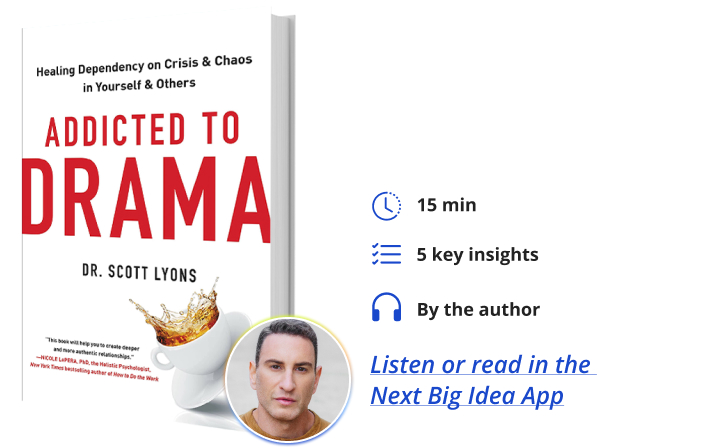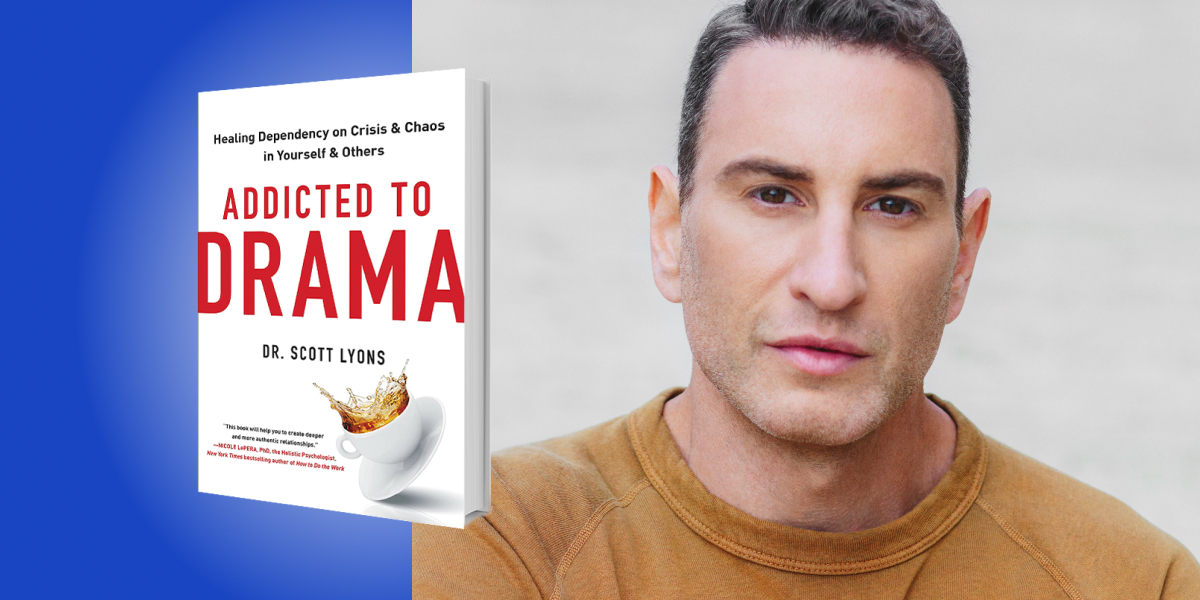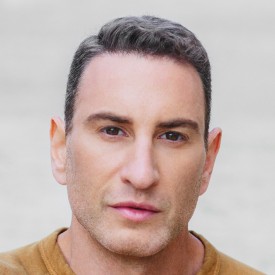Dr. Scott Lyons is an innovator in transformative wellness and trauma therapy. As a clinical psychologist and mind-body medicine specialist, he has taught over half a million people how to break free of cycles of pain, relieve stress, and restore vitality.
Below, Scott shares five key insights from his new book, Addicted to Drama: Healing Dependency on Crisis and Chaos in Yourself and Others. Listen to the audio version—read by Scott himself—in the Next Big Idea App.

1. We all know someone addicted to drama.
From the outside, someone addicted to drama looks and feels different than someone stuck in cycles of crisis and chaos. A person who is addicted to drama will often create mountains out of molehills, meaning they make something bigger than it needs to be, or their reaction is more extreme, intense, and exaggerated than what makes sense.
They make their life (and the lives of others) unnecessarily hard by overscheduling themselves and overcomplicating situations. They tend to focus on the negative and what stresses them out. They don’t even realize how they are stressing themselves by where they are putting all their attention and energy.
They get consumed by social media and compare themselves to other people and respond to it as though they were part of it. For instance, a friend of mine got riled up by a celebrity couple’s divorce—as though they were the child of that couple.
They thrive off gossiping about people they know and even people they don’t know. If they’re not gossiping, then they are often retelling the same emotional stories or venting those stories to as many people as they can.
“Their presence feels like an inescapable tornado of chaos.”
They stir things up when things are calm and seem to get anxious or bored when things are going easy or are too quiet. Their relationships often form in the same way they end: fast and furious. Drama plays out in their relationships as jealousy, blaming, withholding, spying, cheating, intense fights, passionate make-ups, and lack of boundaries. Their presence feels like an inescapable tornado of chaos. It can go from zero to a hundred in the blink of an eye. From the outside, their life feels like a rollercoaster, with high highs, low lows, and lots of twists and turns.
2. The inner world of a drama addict is one of disease and pain.
From the inside perspective, their world feels hard and unfair. It’s like no matter how hard they try, the world is conspiring against them. To reflect this frustration, they might say things like it’s always something or why can’t things just be easier? They feel a lack of control over what is happening to them, including in their behaviors and responses. The bigness of their reactions feels justified by the intensity with which they perceive the world. In reality, their underlying trauma has altered the way they smell, hear, taste, see, and experience time.
For those addicted to drama, they create the storms or find them, and then they get mad that it’s raining. They will say that they hate the drama. On some level, they do, even if they are feeding off of it.
For those with an addiction to drama, relationships feel hard and are a source of constant pain. They typically feel abandoned, betrayed, or that people can’t live up to their expectations. It feels like no one has their back or understands them, and isolation creeps in, as well as a defense to not feel those emotions.
There is an underlying current of anxiousness in whatever they do, a sense that something can go wrong at any minute. Relaxing or finding ease feels like it will leave them exposed or vulnerable. Even when the environment around them is calm and easeful, they feel a sense of urgency. In turn, they feel out of sync with the world. The only moments they feel in sync and validated is when the conditions around them are as chaotic as they feel internally. This is called drama bonding. Essentially, crisis forms a false sense of belonging.
3. Some people chase drama to avoid their trauma.
When pain or trauma occurs in someone’s life, or even in the generations before them, and there isn’t the support, time, resources, or space to process and metabolize the trauma, then that pain gets stored in the mind-body. That person subconsciously seeks ways to protect themselves from the intensity of feelings accompanying the pain.
Emotional and physical pain are nearly indistinguishable as it registers in the nervous system. Addiction is the process of getting hooked and attached to whatever distracts from or offers momentary relief from underlying suffering. The reward center of the brain gets activated regardless of what actions provide the distraction. In the same way that you can get a runner’s high through strenuous exercise, you can get an endorphin high from a stress response. If retelling the same story over and over again diverts your attention from that deep underlying current of anxiety and disease, then it will be rewarded and encouraged as a strategy for future use.
“In the same way that you can get a runner’s high through strenuous exercise, you can get an endorphin high from a stress response.”
Another natural protective mechanism humans have evolved to use in relation to trauma is numbness or dissociation: a protective wall that forms around the pain. Over time, this protective wall spreads, and numbness becomes the person’s baseline experience. They feel empty, unfulfilled, depressed, or like a walking ghost, anchorless in the world. The numbness unintentionally creates a separation between them and the world, causing isolation. Addiction forms to navigate this pervasive loneliness.
We get hooked on what fills that inner void or gives enough sensation to feel alive. The intensity of emotions and the extremes in behaviors and thoughts that stir things up to create extreme feelings can pierce through the threshold of the protective layer of numbness to allow the person to feel something—anything. To feel means we exist, we matter, and we have purpose. Drama is not about making sense; it’s about making sensations.
4. A global pandemic of drama is forming.
Suppose you grew up in a chaotic household, or one lacking emotions, expression, connection, and responsiveness. In both situations, the currency for attaining attention and love could be extreme emotional responses. Essentially adopting whatever strategies work to be seen, witnessed, and attended to, all of which are fundamental needs that ensure safety and preservation.
In a world of nearly eight billion people, attention is one of the most sought-after and precious commodities. Capturing and maintaining focus is the ground for an attention economy, where whoever predicts and holds more focus maximizes profits. Media and technology fight for your attention and pull it towards where they want to direct it, and it becomes harder to bring your attention back to yourself. This leads to a forced self-abandonment that neglects attending to and processing your own needs and feelings.
The primary technique for capturing focus is inducing a stress response through stimulating words, intense images, and a focus on negative or highly charged emotional content. Thus, an attention economy is basically a stress activation economy. It floods the nervous system with overstimulation. Over time, people build a tolerance to the stimuli and become numb to the information overload, so more is required to feel something.
“An attention economy is basically a stress activation economy.”
The same level of activation required to get someone’s focus five or ten years ago is not the same as the amount it takes now. Meaning it takes more violence, sensationalism, and extremes to maintain attention. This cycle has become the new normal—as is the exhaustion, havoc, and chaos on the nervous system from that cycle.
When we aren’t being overstimulated, we will often seek or create the conditions to avoid withdrawal from it, with this withdrawal looking like boredom and feeling like anxiety. The solution becomes another hit of drama.
5. Stress and drama are contagious.
All addictions deeply impact the person navigating them, as well those around them. One of the core aspects of an addiction is that despite the consequences to oneself or those around them, they keep using. What’s unique about addiction to drama is that it is contagious; being a bystander means you will have secondhand stress.
This evolutionary survival mechanism is meant to help prepare for an unknown threat. For example, you have a friend that runs into your house panicked as if they are being chased by something. Before they even say anything, you’re registering stress cues and your physiology automatically begins to mirror theirs so that you can run away too. This same truth applies to when someone in the throes of drama is oozing stress.
Nearly all of us are navigating an addiction to drama, or the secondhand stress that comes with being proximate. Let’s not forget that proximity now includes the over five billion people on social media.
To listen to the audio version read by author Scott Lyons, download the Next Big Idea App today:
































